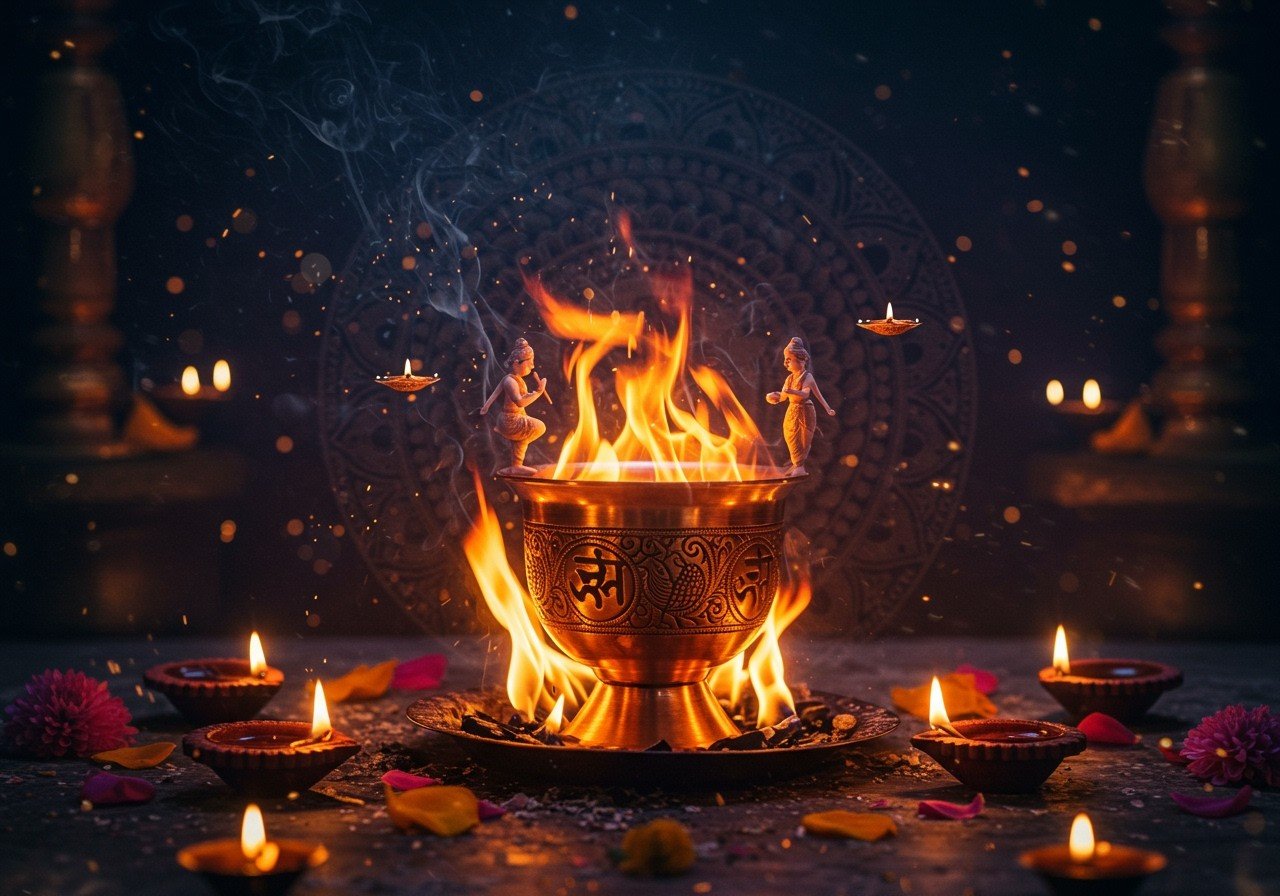
The Dhuni, a sacred fire ritual, holds profound meaning across various Indian spiritual traditions, including Hinduism, Buddhism, and Jainism. It’s more than just flames; it’s a potent symbol of purification, connection to the divine, and a pathway to spiritual growth. Let’s explore the depths of this ancient practice, understanding its symbolism, ritualistic elements, and the transformative benefits it offers.
Unveiling the Symbolism of the Dhuni
The Dhuni fire’s symbolism is multifaceted, representing various aspects of spiritual belief and practice:
-
Shakti Worship: In some traditions, the Dhuni represents a sacred site, symbolizing the divine feminine energy, Shakti, and the generative power of the universe. This connects the ritual to the life-giving and nurturing aspects of the divine.
-
Purification: The act of sitting by a Dhuni is believed to cleanse one’s aura and promote both physical and mental well-being. The fire’s transformative power purifies the surroundings and elevates the spiritual atmosphere.
-
Cosmic Consciousness: The flickering flames symbolize the cosmic energy that pervades the universe, representing creation, sustenance, and transformation. The Dhuni serves as a tangible link to this universal energy.
-
Burning Away Negativity: The Dhuni acts as a sacred fire sacrifice, consuming negativity, purifying the soul, and fostering a deeper connection with the divine. It’s a symbolic act of releasing what no longer serves us.
-
Divine Love (in certain traditions): The Dhuni can also represent the purifying inner fire of divine love, consuming worldly attachments and guiding individuals towards self-realization and a closer relationship with the divine.
The Ritual Elements and Purpose of the Dhuni
The Dhuni ritual involves specific elements, each with its own purpose:
-
Fire as a Messenger (Agni): The fire serves as a conduit to Agni, the Hindu deity of fire, who acts as a divine messenger carrying prayers and offerings to the heavens. It establishes a direct link between the earthly and spiritual realms.
-
Offerings and Gratitude: Offerings made to the Dhuni express gratitude and devotion, strengthening the bond between the individual and the divine. These offerings can include herbs, grains, or other symbolic items.
-
Cleansing and Purification: The smoke rising from the Dhuni is believed to possess purifying properties, dispelling negative energies and sanctifying the environment. It’s also traditionally thought to eliminate harmful germs and bacteria, promoting physical health.
-
Letting Go of Attachments: In some rituals, sandalwood sticks dipped in ghee are offered to the flames, symbolizing the release of attachments and desires, paving the way for spiritual growth and liberation.
Looking for authentic guggal for your Dhuni? We at poojn.in offer a wide variety to suit your needs. From small quantities for personal use to larger sizes for community ceremonies, we’ve got you covered.
Experiencing the Benefits of Dhuni Practices
Engaging with Dhuni rituals can bring about numerous benefits:
-
Mental and Emotional Well-being: The calming effect of the fire and the accompanying chants can reduce stress and anxiety, promote relaxation, improve mental clarity and focus, and foster emotional balance. It creates a peaceful and meditative atmosphere.
-
Spiritual Growth: The Dhuni is seen as a pathway towards spiritual awakening and a more focused channeling of energies. It facilitates a deeper connection with one’s inner self and the divine.
-
Community Building: Participating in communal Dhuni ceremonies strengthens social bonds and reinforces cultural ties. It fosters a sense of unity and shared spiritual experience.
-
Environmental Awareness: The use of natural materials in Dhuni rituals promotes ecological awareness and a sustainable approach to spiritual practices. It reminds us of our connection to nature.
The Dhuni in Practice: A Step-by-Step Guide
Here’s a glimpse into how a Dhuni ritual is typically conducted:
-
Preparation: The process begins with cleaning the designated space, offering prayers, and meticulously selecting pure and natural ingredients like sandalwood, camphor, herbs, and resins. This preparation sets the tone for a sacred experience.
-
The Fire: The fire is kindled using traditional materials like dried cow dung, ghee, incense, and specific herbs within a designated pit or container like a dhuni pot. You can find high-quality dhuni pots and other ritual essentials at poojn.in.
-
Mantras and Devotion: Participants often chant mantras and sing devotional songs, deepening the spiritual atmosphere and invoking positive energies. These chants add a layer of reverence to the ritual.
-
Intention: The intention and devotion with which the ritual is performed play a crucial role in its effectiveness. A sincere and heartfelt approach enhances the spiritual connection.
Enhance your Dhuni experience with authentic Senna leaves from poojn.in. We provide premium quality Senna leaves, carefully sourced and packaged to ensure purity and freshness.
Embracing the Dhuni in Contemporary Life
The Dhuni continues to be a relevant and meaningful practice in modern Indian households. The convenience of online platforms like poojn.in makes it easier than ever to access authentic ritual items, allowing individuals to connect with their cultural heritage and incorporate these practices into their daily lives. Whether you’re a seasoned practitioner or just beginning your spiritual journey, the Dhuni offers a profound way to connect with the divine, purify your surroundings, and experience the transformative power of ancient traditions.


